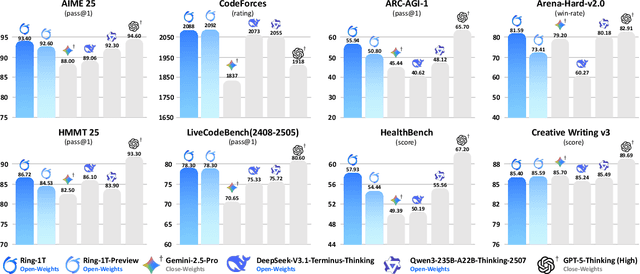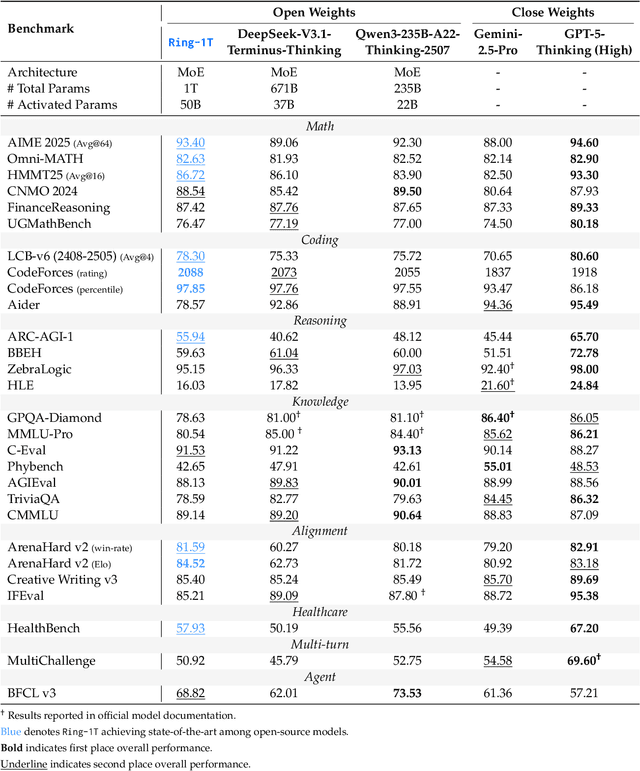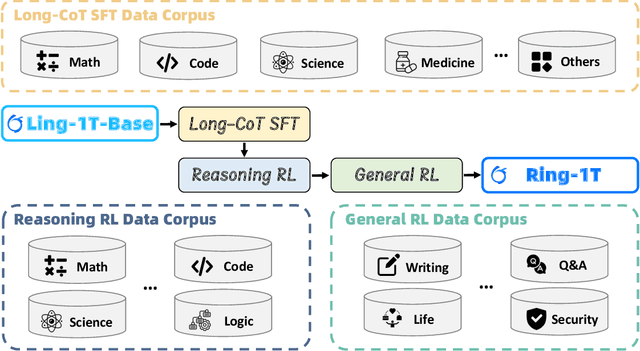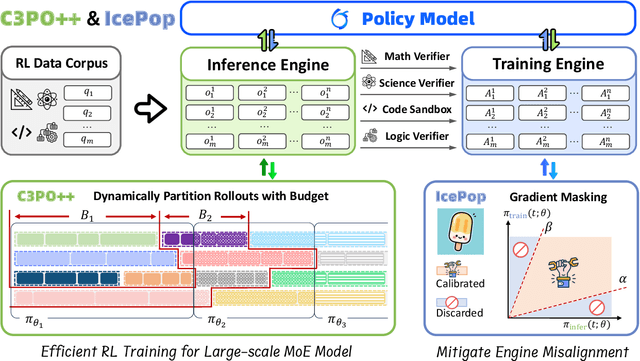Zhiqiang Zhang
InftyThink+: Effective and Efficient Infinite-Horizon Reasoning via Reinforcement Learning
Feb 09, 2026Abstract:Large reasoning models achieve strong performance by scaling inference-time chain-of-thought, but this paradigm suffers from quadratic cost, context length limits, and degraded reasoning due to lost-in-the-middle effects. Iterative reasoning mitigates these issues by periodically summarizing intermediate thoughts, yet existing methods rely on supervised learning or fixed heuristics and fail to optimize when to summarize, what to preserve, and how to resume reasoning. We propose InftyThink+, an end-to-end reinforcement learning framework that optimizes the entire iterative reasoning trajectory, building on model-controlled iteration boundaries and explicit summarization. InftyThink+ adopts a two-stage training scheme with supervised cold-start followed by trajectory-level reinforcement learning, enabling the model to learn strategic summarization and continuation decisions. Experiments on DeepSeek-R1-Distill-Qwen-1.5B show that InftyThink+ improves accuracy by 21% on AIME24 and outperforms conventional long chain-of-thought reinforcement learning by a clear margin, while also generalizing better to out-of-distribution benchmarks. Moreover, InftyThink+ significantly reduces inference latency and accelerates reinforcement learning training, demonstrating improved reasoning efficiency alongside stronger performance.
When Sharpening Becomes Collapse: Sampling Bias and Semantic Coupling in RL with Verifiable Rewards
Jan 26, 2026Abstract:Reinforcement Learning with Verifiable Rewards (RLVR) is a central paradigm for turning large language models (LLMs) into reliable problem solvers, especially in logic-heavy domains. Despite its empirical success, it remains unclear whether RLVR elicits novel capabilities or merely sharpens the distribution over existing knowledge. We study this by formalizing over-sharpening, a phenomenon where the policy collapses onto limited modes, suppressing valid alternatives. At a high level, we discover finite-batch updates intrinsically bias learning toward sampled modes, triggering a collapse that propagates globally via semantic coupling. To mitigate this, we propose inverse-success advantage calibration to prioritize difficult queries and distribution-level calibration to diversify sampling via a memory network. Empirical evaluations validate that our strategies can effectively improve generalization.
Token-level Collaborative Alignment for LLM-based Generative Recommendation
Jan 26, 2026Abstract:Large Language Models (LLMs) have demonstrated strong potential for generative recommendation by leveraging rich semantic knowledge. However, existing LLM-based recommender systems struggle to effectively incorporate collaborative filtering (CF) signals, due to a fundamental mismatch between item-level preference modeling in CF and token-level next-token prediction (NTP) optimization in LLMs. Prior approaches typically treat CF as contextual hints or representation bias, and resort to multi-stage training to reduce behavioral semantic space discrepancies, leaving CF unable to explicitly regulate LLM generation. In this work, we propose Token-level Collaborative Alignment for Recommendation (TCA4Rec), a model-agnostic and plug-and-play framework that establishes an explicit optimization-level interface between CF supervision and LLM generation. TCA4Rec consists of (i) Collaborative Tokenizer, which projects raw item-level CF logits into token-level distributions aligned with the LLM token space, and (ii) Soft Label Alignment, which integrates these CF-informed distributions with one-hot supervision to optimize a soft NTP objective. This design preserves the generative nature of LLM training while enabling collaborative alignment with essential user preference of CF models. We highlight TCA4Rec is compatible with arbitrary traditional CF models and generalizes across a wide range of decoder-based LLM recommender architectures. Moreover, it provides an explicit mechanism to balance behavioral alignment and semantic fluency, yielding generative recommendations that are both accurate and controllable. Extensive experiments demonstrate that TCA4Rec consistently improves recommendation performance across a broad spectrum of CF models and LLM-based recommender systems.
MergeMix: Optimizing Mid-Training Data Mixtures via Learnable Model Merging
Jan 25, 2026Abstract:Optimizing data mixtures is essential for unlocking the full potential of large language models (LLMs), yet identifying the optimal composition remains computationally prohibitive due to reliance on heuristic trials or expensive proxy training. To address this, we introduce \textbf{MergeMix}, a novel approach that efficiently determines optimal data mixing ratios by repurposing model merging weights as a high-fidelity, low-cost performance proxy. By training domain-specific experts on minimal tokens and optimizing their merging weights against downstream benchmarks, MergeMix effectively optimizes the performance of data mixtures without incurring the cost of full-scale training. Extensive experiments on models with 8B and 16B parameters validate that MergeMix achieves performance comparable to or surpassing exhaustive manual tuning while drastically reducing search costs. Furthermore, MergeMix exhibits high rank consistency (Spearman $ρ> 0.9$) and strong cross-scale transferability, offering a scalable, automated solution for data mixture optimization.
Rethinking Sample Polarity in Reinforcement Learning with Verifiable Rewards
Dec 25, 2025Abstract:Large reasoning models (LRMs) are typically trained using reinforcement learning with verifiable reward (RLVR) to enhance their reasoning abilities. In this paradigm, policies are updated using both positive and negative self-generated rollouts, which correspond to distinct sample polarities. In this paper, we provide a systematic investigation into how these sample polarities affect RLVR training dynamics and behaviors. We find that positive samples sharpen existing correct reasoning patterns, while negative samples encourage exploration of new reasoning paths. We further explore how adjusting the advantage values of positive and negative samples at both the sample level and the token level affects RLVR training. Based on these insights, we propose an Adaptive and Asymmetric token-level Advantage shaping method for Policy Optimization, namely A3PO, that more precisely allocates advantage signals to key tokens across different polarities. Experiments across five reasoning benchmarks demonstrate the effectiveness of our approach.
AesTest: Measuring Aesthetic Intelligence from Perception to Production
Nov 09, 2025Abstract:Perceiving and producing aesthetic judgments is a fundamental yet underexplored capability for multimodal large language models (MLLMs). However, existing benchmarks for image aesthetic assessment (IAA) are narrow in perception scope or lack the diversity needed to evaluate systematic aesthetic production. To address this gap, we introduce AesTest, a comprehensive benchmark for multimodal aesthetic perception and production, distinguished by the following features: 1) It consists of curated multiple-choice questions spanning ten tasks, covering perception, appreciation, creation, and photography. These tasks are grounded in psychological theories of generative learning. 2) It integrates data from diverse sources, including professional editing workflows, photographic composition tutorials, and crowdsourced preferences. It ensures coverage of both expert-level principles and real-world variation. 3) It supports various aesthetic query types, such as attribute-based analysis, emotional resonance, compositional choice, and stylistic reasoning. We evaluate both instruction-tuned IAA MLLMs and general MLLMs on AesTest, revealing significant challenges in building aesthetic intelligence. We will publicly release AesTest to support future research in this area.
Every Step Evolves: Scaling Reinforcement Learning for Trillion-Scale Thinking Model
Oct 21, 2025



Abstract:We present Ring-1T, the first open-source, state-of-the-art thinking model with a trillion-scale parameter. It features 1 trillion total parameters and activates approximately 50 billion per token. Training such models at a trillion-parameter scale introduces unprecedented challenges, including train-inference misalignment, inefficiencies in rollout processing, and bottlenecks in the RL system. To address these, we pioneer three interconnected innovations: (1) IcePop stabilizes RL training via token-level discrepancy masking and clipping, resolving instability from training-inference mismatches; (2) C3PO++ improves resource utilization for long rollouts under a token budget by dynamically partitioning them, thereby obtaining high time efficiency; and (3) ASystem, a high-performance RL framework designed to overcome the systemic bottlenecks that impede trillion-parameter model training. Ring-1T delivers breakthrough results across critical benchmarks: 93.4 on AIME-2025, 86.72 on HMMT-2025, 2088 on CodeForces, and 55.94 on ARC-AGI-v1. Notably, it attains a silver medal-level result on the IMO-2025, underscoring its exceptional reasoning capabilities. By releasing the complete 1T parameter MoE model to the community, we provide the research community with direct access to cutting-edge reasoning capabilities. This contribution marks a significant milestone in democratizing large-scale reasoning intelligence and establishes a new baseline for open-source model performance.
Arrows of Math Reasoning Data Synthesis for Large Language Models: Diversity, Complexity and Correctness
Aug 26, 2025Abstract:Enhancing the mathematical reasoning of large language models (LLMs) demands high-quality training data, yet conventional methods face critical challenges in scalability, cost, and data reliability. To address these limitations, we propose a novel program-assisted synthesis framework that systematically generates a high-quality mathematical corpus with guaranteed diversity, complexity, and correctness. This framework integrates mathematical knowledge systems and domain-specific tools to create executable programs. These programs are then translated into natural language problem-solution pairs and vetted by a bilateral validation mechanism that verifies solution correctness against program outputs and ensures program-problem consistency. We have generated 12.3 million such problem-solving triples. Experiments demonstrate that models fine-tuned on our data significantly improve their inference capabilities, achieving state-of-the-art performance on several benchmark datasets and showcasing the effectiveness of our synthesis approach.
A Deep Learning Pipeline Using Synthetic Data to Improve Interpretation of Paper ECG Images
Jul 29, 2025Abstract:Cardiovascular diseases (CVDs) are the leading global cause of death, and early detection is essential to improve patient outcomes. Electrocardiograms (ECGs), especially 12-lead ECGs, play a key role in the identification of CVDs. These are routinely interpreted by human experts, a process that is time-consuming and requires expert knowledge. Historical research in this area has focused on automatic ECG interpretation from digital signals, with recent deep learning approaches achieving strong results. In practice, however, most ECG data in clinical practice are stored or shared in image form. To bridge this gap, we propose a deep learning framework designed specifically to classify paper-like ECG images into five main diagnostic categories. Our method was the winning entry to the 2024 British Heart Foundation Open Data Science Challenge. It addresses two main challenges of paper ECG classification: visual noise (e.g., shadows or creases) and the need to detect fine-detailed waveform patterns. We propose a pre-processing pipeline that reduces visual noise and a two-stage fine-tuning strategy: the model is first fine-tuned on synthetic and external ECG image datasets to learn domain-specific features, and then further fine-tuned on the target dataset to enhance disease-specific recognition. We adopt the ConvNeXt architecture as the backbone of our model. Our method achieved AUROC scores of 0.9688 on the public validation set and 0.9677 on the private test set of the British Heart Foundation Open Data Science Challenge, highlighting its potential as a practical tool for automated ECG interpretation in clinical workflows.
Agentar-Fin-R1: Enhancing Financial Intelligence through Domain Expertise, Training Efficiency, and Advanced Reasoning
Jul 24, 2025Abstract:Large Language Models (LLMs) exhibit considerable promise in financial applications; however, prevailing models frequently demonstrate limitations when confronted with scenarios that necessitate sophisticated reasoning capabilities, stringent trustworthiness criteria, and efficient adaptation to domain-specific requirements. We introduce the Agentar-Fin-R1 series of financial large language models (8B and 32B parameters), specifically engineered based on the Qwen3 foundation model to enhance reasoning capabilities, reliability, and domain specialization for financial applications. Our optimization approach integrates a high-quality, systematic financial task label system with a comprehensive multi-layered trustworthiness assurance framework. This framework encompasses high-quality trustworthy knowledge engineering, multi-agent trustworthy data synthesis, and rigorous data validation governance. Through label-guided automated difficulty-aware optimization, tow-stage training pipeline, and dynamic attribution systems, we achieve substantial improvements in training efficiency. Our models undergo comprehensive evaluation on mainstream financial benchmarks including Fineva, FinEval, and FinanceIQ, as well as general reasoning datasets such as MATH-500 and GPQA-diamond. To thoroughly assess real-world deployment capabilities, we innovatively propose the Finova evaluation benchmark, which focuses on agent-level financial reasoning and compliance verification. Experimental results demonstrate that Agentar-Fin-R1 not only achieves state-of-the-art performance on financial tasks but also exhibits exceptional general reasoning capabilities, validating its effectiveness as a trustworthy solution for high-stakes financial applications. The Finova bench is available at https://github.com/antgroup/Finova.
 Add to Chrome
Add to Chrome Add to Firefox
Add to Firefox Add to Edge
Add to Edge